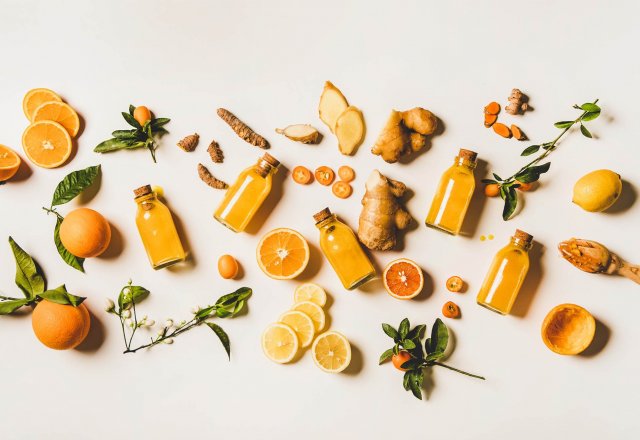
A naturopath’s must-have supplements for winter immunity
A naturopath’s must-have supplements for winter immunity

Eating well, getting enough sleep, and maintaining a regular fitness routine are all crucial for immunity but there are also a few ways to supplement good health.
After almost 20 years in the health industry working as a naturopath, herbalist and Naturopathy lecturer at Endeavour College, I’ve come across some cold and flu remedies that have become staples during the cooler months to boost immunity and stay fighting fit.
Andrographis (also known as Indian echinacea) has been shown to be acutely effective for colds and flus, but it’s important to note that it should only be taken in short bursts. There were some stories during the pandemic about Andrographis supplements causing loss of taste, which highlights the need to follow instructions and consult a professional to avoid side effects from overuse. Recent research also showed that Andrographis (along with green tea, Vitamins C, D and zinc) lowered symptom severity and duration of respiratory events via immune modulation, inflammatory regulation and viral control. Andrographis may be protective for patients at risk of severe consequences from infection.
Elderberry
Elderberry isn’t as well-known as Vitamin C but it packs a punch when it comes to immunity and assisting with colds and flus. It’s one of most researched herbs and has been shown to be effective against viral infections.
Medicinal Mushrooms
Medicinal mushrooms like Reishi, Shitake, Cordyceps and Coriolus may have beneficial effects on our immune response by enhancing immune function and providing antiviral and antibacterial actions. They can trigger the production of Natural Killer cells, which help us fight back against invading pathogens that may help us recover from infections while providing resistance to illness. In addition, they are beneficial for our gut microbiome by acting as a prebiotic source which supplies food for our beneficial flora. These mushrooms with benefits usually come in a powder form and can be mixed with plant-based milks and honey.
Probiotics
Considering that 80 per cent of the immune system resides in the gut, this is a crucial area to support in winter and probiotics are a great tool for good gut health. These tiny live organisms, which we consume in the billions (of colony forming units), can have a big impact on our physical wellbeing. Their antimicrobial effect in the gut promotes immune modulation which makes them an effective tool against allergic and inflammatory responses while at the same time improving resistance to pathogens.
Propolis
Propolis is always in my handbag in winter and whenever I travel, especially on planes. Produced as a by-product of honey production, bees use the sticky substance to coat the inside of the hive and it does the same thing in our throat, reducing the likelihood of bacteria taking hold or infecting the host, which may protect against catching a virus. It’s also valued for its antimicrobial, antiviral and antifungal properties, which have been shown to be effective against viruses like influenza. It may also be useful for sore throats, ear infections and any mild upper respiratory tract infection.
Vitamin C
Long touted for its ability to reduce cold and flu symptoms and ramp up immunity, Vitamin C is one of the most popular supplements in the world. For the best impact against a cold or flu, try liposomal formulations of Vitamin C which have been shown to improve absorption – up to 93 per cent compared to 17 per cent for regular Vitamin C capsules.
Vitamin D
The sunshine vitamin really came into its own during the pandemic with a lot of studies showing how important it was in the fight against COVID-19. It has even been proposed that Vitamin D supplementation could help reduce the severity of a flu for nursing home residents. It has long been known that Vitamin D is useful when it comes to immunity, but it’s estimated that 30-50 per cent of us could be deficient. A daily supplement can top up regular bursts of sunshine.
Zinc
Zinc is one of my favourite supplements, especially when it is in a readily available form like citrate or glycinate for better absorption. Zinc can help with many modern ailments including immunity, as long as it’s taken in the right dose – around 25-50mg daily. Some research during the pandemic showed that absorption was markedly increased when taken with ECGC (from green tea) to increase zinc’s anti-viral activity while other studies revealed that COVID-19 patients lacking in zinc developed more complications.
Please note that you should always seek the advice of a health practitioner and speak to your naturopath before self-prescribing herbal medicine, especially if you are taking any other medication.
WORDS: Tiffany (Fin) Mackenzie
Additional references:
Reis FS, Martins A, Vasconcelos MH, Morales P, Ferreira IC. Functional foods based on extracts or compounds derived from mushrooms. Trends Food Sci Technol. 2017 May 19;66:48-62. doi: http://dx.doi.org/10.1016/j.tifs.2017.05.010.
Zjalic S, Reverberi M, Ricelli A, Granito M, Fanelli C, Fabbri A. Trametes versicolour: a possible tool for aflatoxin control. Int J of Food Microbiol. 2006;107:243-9. PMID: 16337299.
Su CH, Lai MN, Lin CC, Ng LT. Comparative characterization of physicochemical properties and bioactivities of polysaccharides from selected medicinal mushrooms. Appl Microbiol Biotechnol. 2016 May;100(10):4385-93.
Masuda Y, Nakayama Y, Tanaka A, Naito K, Konishi M. Antitumor activity of orally administered maitake α-glucan by stimulating antitumor immune response in murine tumor. PloS One. 2017 Mar 9;12(3):e0173621.
El Enshasy HA, Hatti-Kaul R. Mushroom immunomodulators: unique molecules with unlimited applications. Trends Biotechnol. 2013 Dec;31(12):668-77. doi:10.1016/j.tibtech.2013.09.003.
Ren L, Perera C, Hemar Y. Antitumor activity of mushroom polysaccharides: a review. Food Funct. 2012 Nov;3(11):1118-30. doi: 10.1039/c2fo10279j.
